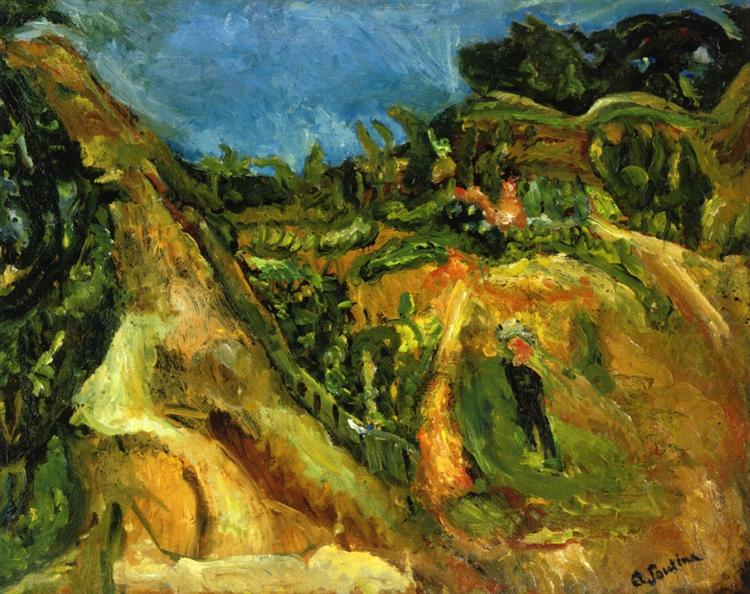Beskrivning
Chaim Soutine, en enastående representant för fransk expressionism och centrala figur i Paris -skolan, har lämnat ett outplånligt märke på konsthistorien genom dess djärva landskap, där känslomässighet och teknik sammanflätas i en dramatisk färgad dans och former. Hans arbete "Landscape of the Noon", som skapades 1918, är ett livligt vittnesbörd om hans talang och erbjuder en intensiv och visceral vision av den naturliga miljön som utmanar traditionella landskapsnormer.
I denna målning är kompositionen artikulerad i en dynamisk struktur av former som är grupperade och spridda, vilket skapar en känsla av nästan hektisk rörelse. Färgerna, som sträcker sig mellan livliga gröna och ockra toner, gäller i en tjock fyllning som gör att bildmaterial nästan kan leva upp på ytan. Denna teknik, Soutine -karakteristik, bidrar till skapandet av en atmosfär som är både påtaglig och stämningsfull; Träden verkar ondular innan en imaginär bris, skuggorna projiceras med ett drama som känns nästan avgörande.
Middagsljuset, ett av de centrala teman i verket, infuserar varje element i tyget med en ljusstyrka som belyser både rikedomen i färger och målningen av målning. Soutine lyckas fånga essensen av ljus i sin renaste form, med en djärv kontrast mellan livliga toner och djupa skuggor. Detta palettval förstärker inte bara sensationen av värme, utan orsakar också en intensiv känslomässig upplevelse hos betraktaren, vilket leder till ett tillstånd av aktiv kontemplation.
Intressant nog presenterar Soutine inte mänskliga figurer i "middagslandskap", vilket förstärker idén att naturen manifesterar sig som en autonom kraft. Frånvaron av mänskliga karaktärer inbjuder emellertid tittaren att höljet helt i landskapets väsen, att bli en del av den sensoriska upplevelsen som framkallar. Soutine lyckas i denna mening öppna en dialog mellan observatören och landskapet och bli medlar mellan extern verklighet och intern uppfattning.
Expressionism, rörelse som Soutine var en pionjär, försöker ofta gå utöver enbart visuell representation, och "middagslandskap" uppfördes som ett perfekt exempel på denna avsikt. Brottet med det klassiska perspektivet och den djärva användningen av färg återspeglar inte bara författarens känslor, utan också det turbulent kreativa sammanhanget av Europa på 1910 -talet, där katastrofer från första världskriget hade satt sitt märke på den kollektiva psyke. Sett i detta sammanhang kan Soutines arbete tolkas som ett slags skydd, en återgång till naturens enkelhet och skönhet i en kaostid.
Detta arbete, även om det ibland kan verka som en formell befrielseövning, är också djupt introspektiv; Fånga kampen mellan mänsklig existens och den naturliga världen, en oro som genomsyrar Soutines arbete under hela sin karriär. Genom "middagslandskap" observerar tittaren inte bara ett landskap, utan fördjupar sig själv i konstnärens egen känslomässiga upplevelse och upptäcker i färgintensiteten och bildar en återspegling av sina egna känslor och minnen.
Soutines målning, även om de ibland förmörs av hans mest uttryckliga eller populära samtida, förblir ett kraftfullt exempel på den uttrycksfulla potentialen i konst. "Middown Landscape", i sin unika, uppfördes som en bekräftelse av konstförmågan att orsaka ett visceralt svar, bli en bro mellan omvärlden och den interna upplevelsen för dem som överväger den. I den rika paletten och de djärva penseldragarna i Soutine är tittaren lindad i en känslomässig resa som är lika personlig som universell, ett bestående vittnesbörd om skönhet som ligger i de enklaste landskapen och djupet de kan framkalla.
KUADROS ©, en berömd färg på din vägg.
Handgjorda oljemålningar, med kvaliteten på professionella konstnärer och den distinkta tätningen av KUADROS ©.
Bilder reproduktionstjänst med tillfredsställelsegaranti. Om du inte är helt nöjd med kopian av din målning, återbetalar vi dina pengar 100%.

